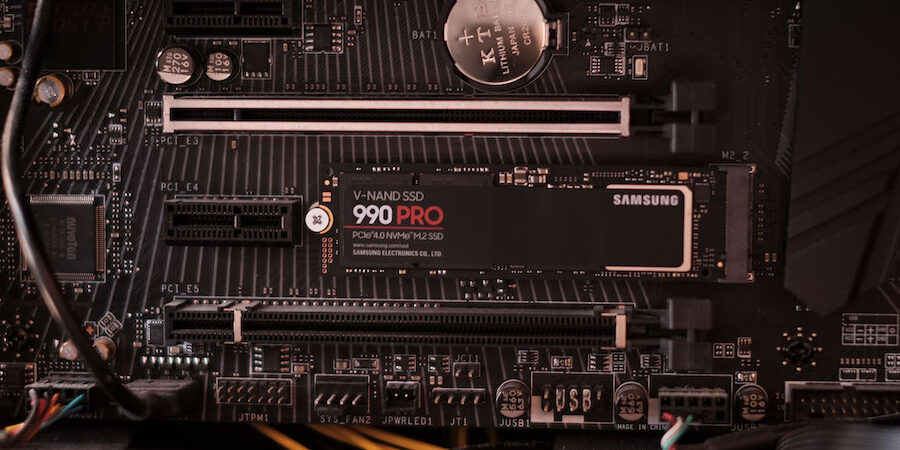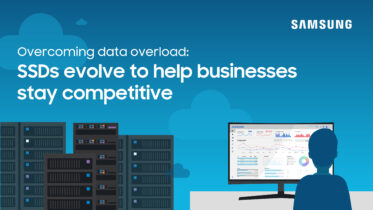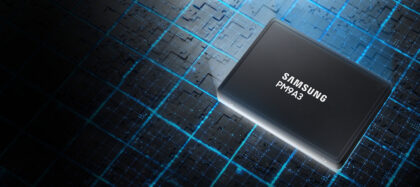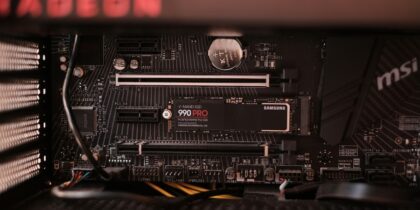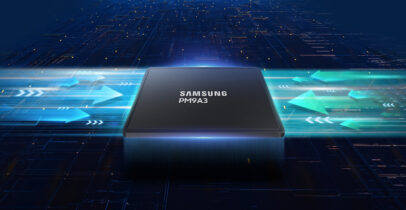There’s now a more affordable option for budget-conscious government agencies that need to improve computing performance but aren’t ready to invest in new computers just yet. By upgrading and equipping existing devices with non-volatile memory express (NVMe®) solid state drives (SSDs), they can enjoy blazing fast speeds that won’t break the bank.
All SSDs are much faster than old-fashioned hard disk drives (HDDs), but SSDs that support the NVMe storage access and transport protocol put the pedal to the metal. That’s particularly important for government workers, who need to tap vast databases at a moment’s notice. Here’s how NVMe SSDs can make a difference.
Why upgrade to NVMe SSDs?
Upgrading computers with an NVMe SSD, such as Samsung 990 PRO, can enable applications to run significantly faster — including government databases installed directly on employees’ desktop computers and laptops. Computers with NVMe SSDs also boot up faster and can access data and save files more quickly. In fact, Greg Schulz, founder of Server StorageIO, an independent IT advisory and consulting firm, called them “a productivity booster” in an interview with Samsung Insights.
Specifically, NVMe SSDs can also resolve performance problems experienced with SATA and SAS transport protocols, which are designed for HDDs and cause performance bottlenecks when used with SSDs. NVMs are purpose-built to enable fast data transfer rates on SSDs with PCIe® (peripheral component interconnect express) — a high-speed standard interface that connects motherboard components. NVMe is the transfer protocol that runs across a PCIe connection.
PCIe-based NVMe SSDs also reduce latency and enable higher input/output operations per second (IOPS), making them ideal for databases, as well as other data-intensive, computer-intensive or graphics-heavy applications.
How to solve government data challenges with SSDs
SSDs provide a reliable solution for managing large amounts of data in the public sector securely. Download Now
Data transfer rates depend on which generation of PCIe an SSD supports. Samsung 990 PRO PCIe 4.0 NVMe SSD, for example, delivers sequential read speeds up to 7450 MB/s — 2.1 times faster than PCIe 3.0 SSDs and 13.3 times faster than SATA SSDs. Samsung 990 PRO also offers sequential write speeds up to 6,900 MB/s and random read/write speeds of up to 1,400K/1,550K IOPS, which is 40% and 55% faster than the previous generation.
Real-world benefits: Speeding government databases
NVMe SSDs accelerate application performance, including in data centers. For example, relational databases in a data center will perform much faster with NVMe SSDs than traditional hard drives, allowing government agencies to run queries much faster.
However, a computer with an NVMe SSD alone may not directly impact the performance of a relational database in a data center. A computer with an NVMe SSD can only boost performance if the database is stored inside the computer itself. For instance, government employees who have built databases on their own PCs will see faster read/write speeds if they are using NVMe SSDs.
According to Schulz, there are other scenarios where NVMe SSDs on computers can improve database performance:
- Government workers need to analyze data to produce a report, so they extract data from a relational database in the data center. Once the extracted data is stored on the workers’ PC hard drives, they can use that data to run an analysis and build a report. When they do, the performance is especially fast thanks to the NVMe SSD on their computers.
- Similarly, if government employees need to update data on a relational database in the data center, they can download the data onto their computers. Access to the data is extremely fast because of the NVMe SSD on their computers. Once they update the data, they can upload the changes back to the main database in the data center.
- It’s Election Day, and for each precinct, election officials download voter registration databases onto laptops. That creates electronic poll books that replace traditional paper poll books, which list eligible voters. With NVMe SSDs, poll workers can quickly search and check in voters on their laptops.
- Government employees work in a field office that uses a high-end computer as a server to house a copy of the main database. Staffers get fast access to the data because of the local copy of the database in their office. The local copy of the database gets updated throughout the day, and the changes get uploaded to the main database in the data center overnight, making sure both are synchronized.
Benefits of Samsung 990 PRO
These are just a few examples of how government agencies can benefit from upgrading storage with Samsung 990 PRO NVMe SSDs.
NVMe SSDs are a powerful, cost-effective solution that can improve worker security and productivity. They are also more reliable and durable than HDDs, as they contain no moving parts.
In addition, NVMe SSDs support high storage capacities in small form factors, such as M.2. Samsung 990 PRO, for example, comes in an M.2 form factor and is available in 1TB and 2TB configurations.
Enjoy exclusive volume discounts and other deals on Samsung’s 990 PRO NVMe SSDs and other solutions with a Samsung Business Account. Get more tips on managing government database challenges using SSDs from this free white paper.
